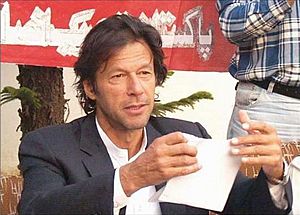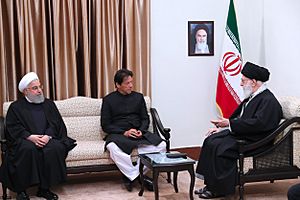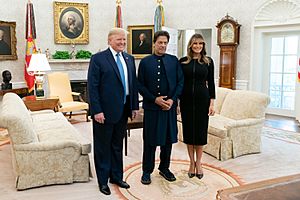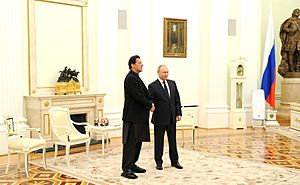Imran Khan facts for kids
Quick facts for kids
Imran Khan
HI PP FRCPE
|
||||||||||||||||||||||||||||||||||||||||||||||||||||||||||||||||||||||||||||||||||||||||||||||||||||||||||||||||||||||||||||||||||
|---|---|---|---|---|---|---|---|---|---|---|---|---|---|---|---|---|---|---|---|---|---|---|---|---|---|---|---|---|---|---|---|---|---|---|---|---|---|---|---|---|---|---|---|---|---|---|---|---|---|---|---|---|---|---|---|---|---|---|---|---|---|---|---|---|---|---|---|---|---|---|---|---|---|---|---|---|---|---|---|---|---|---|---|---|---|---|---|---|---|---|---|---|---|---|---|---|---|---|---|---|---|---|---|---|---|---|---|---|---|---|---|---|---|---|---|---|---|---|---|---|---|---|---|---|---|---|---|---|---|---|
| عمران خان | ||||||||||||||||||||||||||||||||||||||||||||||||||||||||||||||||||||||||||||||||||||||||||||||||||||||||||||||||||||||||||||||||||
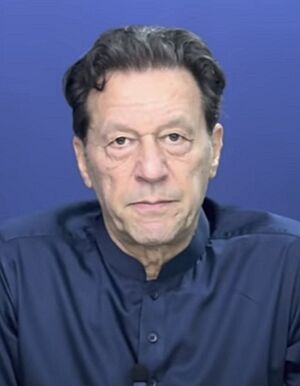
Khan in 2023
|
||||||||||||||||||||||||||||||||||||||||||||||||||||||||||||||||||||||||||||||||||||||||||||||||||||||||||||||||||||||||||||||||||
| 19th Prime Minister of Pakistan | ||||||||||||||||||||||||||||||||||||||||||||||||||||||||||||||||||||||||||||||||||||||||||||||||||||||||||||||||||||||||||||||||||
| In office 18 August 2018 – 10 April 2022 |
||||||||||||||||||||||||||||||||||||||||||||||||||||||||||||||||||||||||||||||||||||||||||||||||||||||||||||||||||||||||||||||||||
| President | ||||||||||||||||||||||||||||||||||||||||||||||||||||||||||||||||||||||||||||||||||||||||||||||||||||||||||||||||||||||||||||||||||
| Preceded by | Nasirul Mulk (caretaker) | |||||||||||||||||||||||||||||||||||||||||||||||||||||||||||||||||||||||||||||||||||||||||||||||||||||||||||||||||||||||||||||||||
| Succeeded by | Shehbaz Sharif | |||||||||||||||||||||||||||||||||||||||||||||||||||||||||||||||||||||||||||||||||||||||||||||||||||||||||||||||||||||||||||||||||
| Chairman of the Pakistan Tehreek-e-Insaf | ||||||||||||||||||||||||||||||||||||||||||||||||||||||||||||||||||||||||||||||||||||||||||||||||||||||||||||||||||||||||||||||||||
| In office 25 April 1996 – 2 December 2023 |
||||||||||||||||||||||||||||||||||||||||||||||||||||||||||||||||||||||||||||||||||||||||||||||||||||||||||||||||||||||||||||||||||
| Vice-Chairman | Shah Mahmood Qureshi | |||||||||||||||||||||||||||||||||||||||||||||||||||||||||||||||||||||||||||||||||||||||||||||||||||||||||||||||||||||||||||||||||
| Preceded by | Position established | |||||||||||||||||||||||||||||||||||||||||||||||||||||||||||||||||||||||||||||||||||||||||||||||||||||||||||||||||||||||||||||||||
| Succeeded by | Gohar Ali Khan | |||||||||||||||||||||||||||||||||||||||||||||||||||||||||||||||||||||||||||||||||||||||||||||||||||||||||||||||||||||||||||||||||
| Member of the National Assembly | ||||||||||||||||||||||||||||||||||||||||||||||||||||||||||||||||||||||||||||||||||||||||||||||||||||||||||||||||||||||||||||||||||
| In office 13 August 2018 – 21 October 2022 |
||||||||||||||||||||||||||||||||||||||||||||||||||||||||||||||||||||||||||||||||||||||||||||||||||||||||||||||||||||||||||||||||||
| Preceded by | Obaidullah Shadikhel | |||||||||||||||||||||||||||||||||||||||||||||||||||||||||||||||||||||||||||||||||||||||||||||||||||||||||||||||||||||||||||||||||
| Constituency | NA-95 Mianwali-I | |||||||||||||||||||||||||||||||||||||||||||||||||||||||||||||||||||||||||||||||||||||||||||||||||||||||||||||||||||||||||||||||||
| Majority | 113,523 (44.89%) | |||||||||||||||||||||||||||||||||||||||||||||||||||||||||||||||||||||||||||||||||||||||||||||||||||||||||||||||||||||||||||||||||
| In office 19 June 2013 – 31 May 2018 |
||||||||||||||||||||||||||||||||||||||||||||||||||||||||||||||||||||||||||||||||||||||||||||||||||||||||||||||||||||||||||||||||||
| Preceded by | Hanif Abbasi | |||||||||||||||||||||||||||||||||||||||||||||||||||||||||||||||||||||||||||||||||||||||||||||||||||||||||||||||||||||||||||||||||
| Succeeded by | Sheikh Rashid Shafique | |||||||||||||||||||||||||||||||||||||||||||||||||||||||||||||||||||||||||||||||||||||||||||||||||||||||||||||||||||||||||||||||||
| Constituency | NA-56 Rawalpindi-VII | |||||||||||||||||||||||||||||||||||||||||||||||||||||||||||||||||||||||||||||||||||||||||||||||||||||||||||||||||||||||||||||||||
| Majority | 13,268 (8.28%) | |||||||||||||||||||||||||||||||||||||||||||||||||||||||||||||||||||||||||||||||||||||||||||||||||||||||||||||||||||||||||||||||||
| In office 10 October 2002 – 3 November 2007 |
||||||||||||||||||||||||||||||||||||||||||||||||||||||||||||||||||||||||||||||||||||||||||||||||||||||||||||||||||||||||||||||||||
| Preceded by | Constituency established | |||||||||||||||||||||||||||||||||||||||||||||||||||||||||||||||||||||||||||||||||||||||||||||||||||||||||||||||||||||||||||||||||
| Succeeded by | Nawabzada Malik Amad Khan | |||||||||||||||||||||||||||||||||||||||||||||||||||||||||||||||||||||||||||||||||||||||||||||||||||||||||||||||||||||||||||||||||
| Constituency | NA-71 Mianwali-I | |||||||||||||||||||||||||||||||||||||||||||||||||||||||||||||||||||||||||||||||||||||||||||||||||||||||||||||||||||||||||||||||||
| Majority | 6,204 (4.49%) | |||||||||||||||||||||||||||||||||||||||||||||||||||||||||||||||||||||||||||||||||||||||||||||||||||||||||||||||||||||||||||||||||
| Chancellor of the University of Bradford | ||||||||||||||||||||||||||||||||||||||||||||||||||||||||||||||||||||||||||||||||||||||||||||||||||||||||||||||||||||||||||||||||||
| In office 7 December 2005 – 8 December 2014 |
||||||||||||||||||||||||||||||||||||||||||||||||||||||||||||||||||||||||||||||||||||||||||||||||||||||||||||||||||||||||||||||||||
| Preceded by | Betty Lockwood | |||||||||||||||||||||||||||||||||||||||||||||||||||||||||||||||||||||||||||||||||||||||||||||||||||||||||||||||||||||||||||||||||
| Succeeded by | Kate Swann | |||||||||||||||||||||||||||||||||||||||||||||||||||||||||||||||||||||||||||||||||||||||||||||||||||||||||||||||||||||||||||||||||
| Personal details | ||||||||||||||||||||||||||||||||||||||||||||||||||||||||||||||||||||||||||||||||||||||||||||||||||||||||||||||||||||||||||||||||||
| Born |
Imran Ahmad Khan Niazi
5 October 1952 Lahore, West Punjab, Dominion of Pakistan |
|||||||||||||||||||||||||||||||||||||||||||||||||||||||||||||||||||||||||||||||||||||||||||||||||||||||||||||||||||||||||||||||||
| Political party | Pakistan Tehreek-e-Insaf (since 1996) | |||||||||||||||||||||||||||||||||||||||||||||||||||||||||||||||||||||||||||||||||||||||||||||||||||||||||||||||||||||||||||||||||
| Spouses |
Bushra Bibi
(m. 2018) |
|||||||||||||||||||||||||||||||||||||||||||||||||||||||||||||||||||||||||||||||||||||||||||||||||||||||||||||||||||||||||||||||||
| Children | 2 | |||||||||||||||||||||||||||||||||||||||||||||||||||||||||||||||||||||||||||||||||||||||||||||||||||||||||||||||||||||||||||||||||
| Relatives | Family of Imran Khan | |||||||||||||||||||||||||||||||||||||||||||||||||||||||||||||||||||||||||||||||||||||||||||||||||||||||||||||||||||||||||||||||||
| Residences |
|
|||||||||||||||||||||||||||||||||||||||||||||||||||||||||||||||||||||||||||||||||||||||||||||||||||||||||||||||||||||||||||||||||
| Education | Keble College, Oxford (B.A.) | |||||||||||||||||||||||||||||||||||||||||||||||||||||||||||||||||||||||||||||||||||||||||||||||||||||||||||||||||||||||||||||||||
| Awards | See list | |||||||||||||||||||||||||||||||||||||||||||||||||||||||||||||||||||||||||||||||||||||||||||||||||||||||||||||||||||||||||||||||||
| Signature |  |
|||||||||||||||||||||||||||||||||||||||||||||||||||||||||||||||||||||||||||||||||||||||||||||||||||||||||||||||||||||||||||||||||
| Nicknames | Kaptaan (Captain) Qaidi No. 804 (Prisoner No. 804) |
|||||||||||||||||||||||||||||||||||||||||||||||||||||||||||||||||||||||||||||||||||||||||||||||||||||||||||||||||||||||||||||||||
|
||||||||||||||||||||||||||||||||||||||||||||||||||||||||||||||||||||||||||||||||||||||||||||||||||||||||||||||||||||||||||||||||||
Imran Ahmad Khan Niazi (Urdu: عمران احمد خان نیازی born 5 October 1952) is a Pakistani politician and former cricketer who served as the 22nd prime minister of Pakistan from August 2018 until April 2022. He is the founder and former chairman of the political party Pakistan Tehreek-e-Insaf (PTI) from 1996 to 2023. He was the captain of the Pakistan national cricket team throughout the 1980s and early 90s.
Born to a Niazi Pashtun family of Punjab in Lahore, Khan graduated from Keble College, Oxford. He began his international cricket career in a 1971 Test series against England. Khan played until 1992, served as the team's captain intermittently between 1982 and 1992, and won the 1992 Cricket World Cup, Pakistan's only victory in the competition. Considered one of cricket's greatest all-rounders, Khan was later inducted into the ICC Cricket Hall of Fame. Founding the Pakistan Tehreek-e-Insaf (PTI) in 1996, Khan won a seat in the National Assembly in the 2002 general election, serving as an opposition member from Mianwali until 2007. PTI boycotted the 2008 general election and became the second-largest party by popular vote in the 2013 general election. In the 2018 general election, running on a populist platform, PTI became the largest party in the National Assembly, and formed a coalition government with independents with Khan as prime minister.
As prime minister, Khan addressed a balance of payments crisis with bailouts from the IMF. He presided over a shrinking current account deficit, and limited defence spending to curtail the fiscal deficit, leading to some general economic growth. He enacted policies that increased tax collection and investment. His government committed to a renewable energy transition, launched the Ehsaas Programme and the Plant for Pakistan initiative, and expanded the protected areas of Pakistan. He presided over the COVID-19 pandemic, which caused economic turmoil and rising inflation in the country, threatening his political position.
Amid a constitutional crisis, Khan became the first prime minister to be removed from office through a no-confidence motion in April 2022. In August, he was charged under anti-terror laws. In October, Khan was disqualified by the Election Commission of Pakistan from taking office for the current term of the National Assembly of Pakistan, regarding the Toshakhana reference case. In November, he survived an assassination attempt during a political rally in Wazirabad, Punjab.
On 9 May 2023, Khan was arrested on corruption charges at the Islamabad High Court by paramilitary troops who smashed their way into the courthouse. Protests broke out throughout Pakistan resulting in the arrest of several thousands of Khan's supporters along with military installations being ransacked. After his release, he blamed the Chief of Army Staff Asim Munir for his arrest. The army responded by terming 9 May as "Black Day", with Minister of MoPD Ahsan Iqbal terming it as Pakistan's 9/11. He was sentenced to a three-year jail term on 5 August 2023 and was subsequently arrested for the second time. On 30 January 2024, a special court sentenced Khan to 10 years in prison after he was found guilty of making public the contents of a secret cable sent by Pakistan's ambassador in Washington to the government in Islamabad. The decision of the special court relating to the diplomatic cable was overturned by the Islamabad High Court on 3 June 2024.
On 17 January 2025, Khan was sentenced to 14 years in prison by an accountability court in the Al-Qadir Trust case, while his wife, Bushra Bibi, received a seven-year jail term.
Contents
Early life and family
Khan was born in Lahore on 5 October 1952. He is the only son of Ikramullah Khan Niazi, a civil engineer, and his wife Shaukat Khanum, and has four sisters. Like his father, Khan's mother was an ethnic Pashtun.
A quiet and shy boy in his youth, Khan grew up with his sisters in relatively affluent, upper middle-class circumstances and received a privileged education. He was educated at the Aitchison College and Cathedral School in Lahore, and then the Royal Grammar School Worcester in England, where he excelled at cricket. In 1972, he enrolled in Keble College, Oxford where he studied Philosophy, Politics and Economics, graduating in 1975. An enthusiast for college cricket at Keble, Paul Hayes, was instrumental in securing the admission of Khan, after he had been turned down by Cambridge.
Cricket career
Khan began his international cricket career at age 18, in a 1971 Test series against England. Khan played until 1992, served as the team's captain intermittently between 1982 and 1992, and won the 1992 Cricket World Cup, in what is Pakistan's first and only victory in the competition.
Khan ended his career with 88 Test matches, 126 innings and scored 3807 runs at an average of 37.69, including six centuries and 18 fifties. His highest score was 136. As a bowler, he took 362 wickets in Test cricket, which made him the first Pakistani and world's fourth bowler to do so. Khan was inducted into the ICC Cricket Hall of Fame.
Philanthropy
During the 1990s, Khan also served as UNICEF's Special Representative for Sports and promoted health and immunisation programmes in Bangladesh, Pakistan, Sri Lanka and Thailand. While in London, he also works with the Lord's Taverners, a cricket charity. Khan focused his efforts solely on social work. By 1991, he had founded the Shaukat Khanum Memorial Trust, a charity organisation bearing the name of his mother, Mrs. Shaukat Khanum. As the Trust's maiden endeavour, Khan established Pakistan's first and only cancer hospital, constructed using donations and funds exceeding $25 million, raised by Khan from all over the world.
On 27 April 2008, Khan established a technical college in the Mianwali District called Namal College. It was built by the Mianwali Development Trust (MDT), and is an associate college of the University of Bradford in December 2005. Imran Khan Foundation is another welfare work, which aims to assist needy people all over Pakistan. It has provided help to flood victims in Pakistan. Buksh Foundation has partnered with the Imran Khan Foundation to light up villages in Dera Ghazi Khan, Mianwali and Dera Ismail Khan under the project 'Lighting a Million Lives'. The campaign will establish several Solar Charging Stations in the selected off-grid villages and will provide villagers with solar lanterns, which can be regularly charged at the solar-charging stations.
Political career
Khan was offered political positions more than a few times during his cricketing career. In 1987, then-President Muhammad Zia-ul-Haq offered him a political position in Pakistan Muslim League (PML) which he declined. He was also invited by Nawaz Sharif to join his political party.
In 1993, Khan was appointed as the ambassador for tourism in the caretaker government of Moeen Qureshi and held the portfolio for three months until the government dissolved.
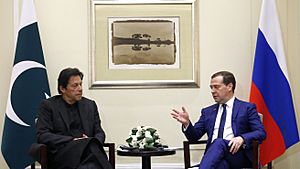
On 25 April 1996, Khan founded a political party, Pakistan Tehreek-e-Insaf (PTI). He won a seat in the National Assembly in the 2002 general election, serving as an opposition member from Mianwali until 2007. PTI boycotted the 2008 general election and became the second-largest party by popular vote in the 2013 general election. In the 2018 general election, running on a populist platform, PTI became the largest party in the National Assembly, and formed a coalition government with independents with Khan as Prime Minister.
Prime Minister of Pakistan
As Prime Minister, Khan addressed a balance of payments crisis with bailouts from the International Monetary Fund. He presided over a shrinking current account deficit, and limited defence spending to curtail the fiscal deficit, leading to some general economic growth. He enacted policies that increased tax collection, and investment. His government committed to a renewable energy transition, launched the Ehsaas Programme and the Plant for Pakistan initiative, and expanded the protected areas of Pakistan. The government also introduced of an electric vehicle (EV) policy, the first in South Asia.
Khan presided over the COVID-19 pandemic, which caused economic turmoil and rising inflation in the country, and threatened his political position. Despite a promised anti-corruption campaign, the perception of corruption in Pakistan worsened during Khan's time in office. He was accused of political victimisation of opponents and clamping down on freedom of expression and dissent.
Amid a constitutional crisis, Khan became the first Prime Minister to be removed from office through a no-confidence motion in April 2022. A move which he termed as being 'politically motivated'. In November, he survived an assassination attempt during a political rally in Wazirabad, Punjab.
Foreign affairs
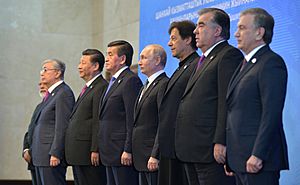
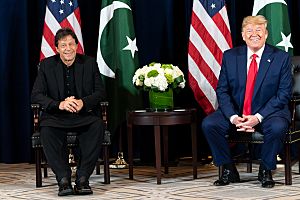
In foreign policy, Khan voiced support for the 2019 Turkish offensive into north-eastern Syria against the Kurdish-led SDF. On 11 October 2019, Khan told the Turkish president Recep Tayyip Erdoğan that "Pakistan fully understands Turkey's concerns relating to terrorism". Khan's foreign policy towards neighbouring Afghanistan consists primarily of support for the Afghan peace process and also inaugurated a 24/7 border crossing with Afghanistan to facilitate travel and trade. He said that Pakistan will never recognize Israel until a Palestinian state is created, a statement in line with the vision of Pakistan's founder Muhammad Ali Jinnah.
According to the British newspaper The Independent, Khan's government had improved Pakistan's reputation abroad by stepping into its role as a 'world player'. In 2019, Khan was included in the Time 100, Time's annual list of the 100 most influential people in the world.
Khan also pursued a reset in ties with Gulf Arab states such as the United Arab Emirates and Saudi Arabia, with the UAE agreeing to roll over Pakistan's debt on an interest-free loan. Subsequently, Khan embarked on a three-day visit to the Kingdom of Saudi Arabia in order to reset ties, where he was personally received at the airport by Mohammad bin Salman. The ties had become tense previously due to the unwillingness of Pakistan to contribute militarily to the Saudi Arabian–led intervention in Yemen. Saudi Arabia's ambassador to Pakistan confirmed that the Saudi government had approved a concessionary loan for building a hydroelectric dam, the Mohmand dam. Khan's government also improved ties with the Gulf state of Kuwait, as Kuwait confirmed it had lifted a ten-year visa ban on Pakistani nationals. Khan's government enhanced economic ties with Qatar which is expected to benefit Pakistan by US$3 billion over 10 years by renegotiating terms in an energy supply deal which saw a significant reduction in Pakistan's energy import bill compared to the previous deal. Khan was mediating between Iran and Saudi Arabia in an effort to end the war in Yemen, which is part of an Iran–Saudi Arabia proxy conflict.
On 9 May 2021, Khan condemned the Israeli police actions at Al-Aqsa Mosque, stating that such actions violated "all norms of humanity and [international] law". Also, Khan has been vocal on the Kashmir issue, and his government adopted the foreign policy stance that no talks will be held with India on the Kashmir dispute until autonomy was restored in Indian-held Kashmir. Khan's national security adviser Moeed Yusuf confirmed that backdoor contacts with India (ostensibly brokered by the UAE) had broken down after India had refused to restore the region's autonomy.
In August 2021, Khan celebrated the departure of the United States from Afghanistan, describing it as Afghans breaking "the shackles of slavery".
After twenty-three years without a visit from a premiere of Pakistan visiting Moscow, Khan became the first such official of the century when he landed in the Russian capital on 23 February, for a two-day trip, where he planned to discuss "key issues of bilateral interest with top leadership," according to the Foreign Office of Pakistan. Nawaz Sharif, in March 1999, was the last to visit Moscow until then. Radio Pakistan reported the two leaders discussed "economic and energy cooperation," namely, a several billion dollar Pakistan Stream Gas Pipeline project that Russian enterprise partnered in developing southward from Karachi to Punjab.
The pipeline, which began in 2020, is the result of a 2015 agreement for a 1,100 km pipeline with a designed capacity ranging from 12.4–16 billion cubic meters, with Russia financing 26% of costs, which ranged from USD$1.5–3.5 billion. It was expected that even under sanctions against Russia, Pakistan could still import up to 14 billion cubic meters of liquid natural gas (LNG) from the vast Russian reserves to the "energy-staved power plants" in Pakistan. The Eurasian Pipeline Consortium and pipeline supplier TMK were tasked with the completing the route.
Of the timing on the talks, Khan explained that he was invited by Putin months in advance, but furthermore that he was not interested in joining any "blocs" and welcomed neutrality, in hopes of "peace and harmony within and among societies."
Personal life
He had numerous relationships during his bachelor life.
On 16 May 1995, Khan married Jemima Goldsmith, in a two-minute ceremony conducted in Urdu in Paris. A month later, on 21 June, they were married again in a civil ceremony at the Richmond registry office in England. Jemima converted to Islam upon marriage. The couple have two sons, Sulaiman Isa and Kasim. On 22 June 2004, it was announced that the couple had divorced, ending the nine-year marriage because it was "difficult for Jemima to adapt to life in Pakistan."
In January 2015, it was announced that Khan married British-Pakistani journalist Reham Khan in a private Nikah ceremony at his residence in Islamabad. However, Reham Khan later states in her autobiography that they in fact got married in October 2014 but the announcement only came in January the year after. On 22 October, they announced their intention to file for divorce.
In mid-2016, late 2017 and early 2018, reports emerged that Khan had married his spiritual mentor (murshid), Bushra Bibi. Khan, PTI aides and members of the Manika family denied the rumour. Khan termed the media "unethical" for spreading the rumour, and PTI filed a complaint against the news channels that had aired it. On 7 January 2018, however, the PTI central secretariat issued a statement that said Khan had proposed to Manika, but she had not yet accepted his proposal. On 18 February 2018, PTI confirmed Khan has married Manika. According to Khan, his life has been influenced by Sufism for three decades, and this is what drew him closer to his wife.
Khan resides in his sprawling farmhouse at Bani Gala.
As of 2018, he owned five pet dogs, who resided in his estate.
Awards and honours
Literary work
Khan has published six works of non-fiction, including an autobiography co-written with Patrick Murphy. He has also written about the modern history of Pakistan in his book Main Aur Mera Pakistan published in 2014 in Urdu and Hindi. The book contains details about Pakistan's wars with India in 1965 and 1971, the impact of 1979 Iranian Revolution and capture of terrorist Osama bin Laden at Abbottabad in 2011. He periodically writes editorials on cricket and Pakistani politics in several leading Pakistani and British newspapers. Khan's most recent book was published in 2011, an autobiography about his transition from cricketer to politician, as well as the challenges he faced in his philanthropic work.
Khan has also penned op-eds in various media outlets, including CNN where he advocated for conversation and restoration of damaged natural ecosystems.
In June 2024, reports emerged that Imran, while in prison, has been writing a book over the past few months and has already completed over 300 pages.
See also
 In Spanish: Imran Khan para niños
In Spanish: Imran Khan para niños
- Family of Imran Khan
- Goldschmidt family
- Pets of Imran Khan
- List of international cricket five-wicket hauls by Imran Khan
- Player of the Match awards (cricket)
- List of sportsperson-politicians
- KP Sharma Oli
Images for kids
-
Khan at a political rally in Peshawar in 1996
-
Khan served as the chancellor of the University of Bradford between November 2005 and November 2014.
-
Imran Khan speaking at the Chatham House in London
-
Imran Khan at the conference "Rule of Law: The Case of Pakistan" organised by the Heinrich Böll Foundation in Berlin.
-
Khan with US Secretary of State John Kerry after the 2013 elections
-
Khan holding a media press with Arif Alvi during 2018 electoral campaign


